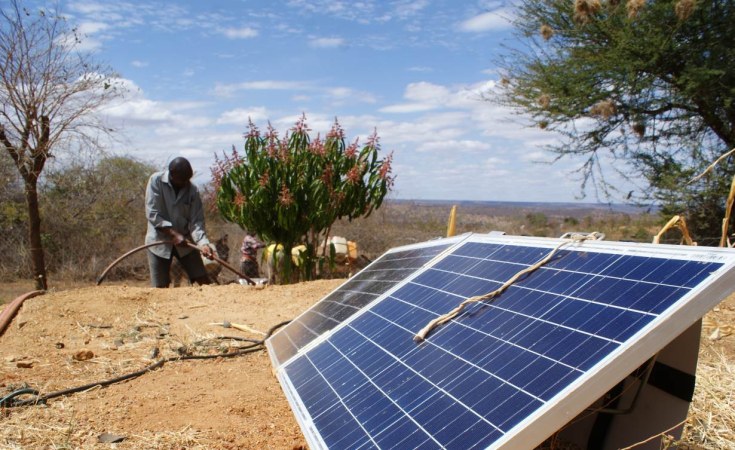A CLEAN energy programme funded to the tune of US$1,5 million was officially launched in Bulawayo yesterday to boost the Government drive to scale up development of renewable energy solutions that positively impact of livelihoods.
The adoption of clean energy solutions is gaining momentum globally as countries seek to reduce carbon emissions in line with climate change mitigation commitments and taming human activity-induced adverse effects of global warming.
The US$1,5 million energy offer, provided by the United Nations Development Programme (UNDP), thus, comes in handy in buttressing the country's commitments to developing environmentally friendly energy solutions in line with the global sustainable development goals.
The initial investment under the initiative will be directed towards the pilot model of up to 50 percent subsidy for renewable energy projects capital costs as viability gap funding, said Energy and Power Development Minister Zhemu Soda, who presided over the officially launch of the programme at a local hotel.
He said the programme comes at a time when the country's electricity penetration remains subdued at f 44 percent, with many families, mainly rural communities lacking access to modern energy services.
"Electricity access levels in rural areas is below 20 percent with the balance available to urbanites although we have seen increased penetration of small portable solar systems, which I hope will be revealed in the census currently underway," said Minister Soda.
"Our challenge remains that of funding of new projects to increase access to modern energy in order to achieve universal access by 2030.
"It is undesirable to indicate that the country has a power supply deficit, which accounts for load shedding experienced especially during peak hours."
The minister said Zimbabwe has a peak power demand of 1 700MW against an achievable power generation in the range of 1 200-1 400MW. This has seen the country importing power from neighbours in the SADC region at a huge cost in order to address the supply-demand gap.
Under the National Development Strategy (NDS1), Minister Soda said Zimbabwe has adopted a transformative approach towards provision of adequate energy and power services to all sectors of the economy.
In that regard, he said the country's projected growth requires a clear roadmap on how the energy needs of the growing economy will be met.
These have been clearly outlined under targets in the Renewable Energy Policy for various technologies whose resources are available within the country.
"We have resolved to upgrade our energy generation, transmission and distribution network during the course of the NDS1 programme, most importantly, we will expand our energy generation facilities together with reinforcing our transmission and distribution infrastructure in order to reduce on losses on power incurred through wheeling of electricity," said Minister Soda.
He said renewable energy has been globally identified as a low-hanging fruit towards realising the goal of increasing electrification of rural communities and the crucial role being played by renewable energy mini-grid systems, which will see the rapid deployment of rural clean sustainable energy in rural communities.
"Through the Rural Electrification Fund (REF), the Government of Zimbabwe is looking for partners who can fund or facilitate funding for rural-based renewable energy mini-grids and other renewable energy-based technologies like solar water pumping and irrigation for communities," said the minister.
"The girl child remains key in our initiatives as we seek to level the playing field for both boys and girls."
The Government is already pushing for the completion of the US$1,4 billion Hwange units 7 and 8 project, which will add 600MW to the national grid with project was now at 82 percent completion. There are also efforts to rehabilitate old units in Hwange and smaller thermals to improve system reliability.
The minister said the Batoka 2x1200MW project was underway as well as the extension of the 50MW thermal power station being established by a Chinese investor in Hwange.
He said several solar power plants were also under construction such as Harava (25MW), Centragrid (25MW), Solgas (additional 10MW), Blanket Mine solar project (17MW), Guruve (5MW), Richaw Solar (5MW) and PPC Zimbabwe (30MW), which was officially commenced through ground breaking alongside the ZITF.
"I am told these solar projects will be completed in 2022 and a few others in 2023, well within the NDS1 time horizon," said Minister Soda.
"We will also develop rural solar projects through Rural Electrification Fund while feasibility studies for wind energy and waste-to-energy, among others will be carried out."
UNDP resident representative, Ms Mia Seppo, said they were excited to mobilise the clean energy grant to accelerate access to sustainable and affordable energy in Zimbabwe.
She said the grant the funding should be fully utilised before year-end, which will kickstart and unlock further funding for the energy sector.
"Affordable and sustainable energy constitutes one of the six strategic impact areas of UNDP's Africa promise, focusing on energy interventions as enablers of development," she said.
Ms Seppo acknowledged the efforts by the Government towards increasing energy generation and supply capacity as well as creating an enabling policy environment.
"We are excited today to be launching a pro-poor intervention that will accelerate access to sustainable, affordable, and clean energy that will drive the implementation of sustainable development goals achievement in Zimbabwe," she said.
"This partnership between the Government and the private sector to finance the development and deployment of renewable energy demonstrates the new thinking and financing models, which will deliver impact at scale."


